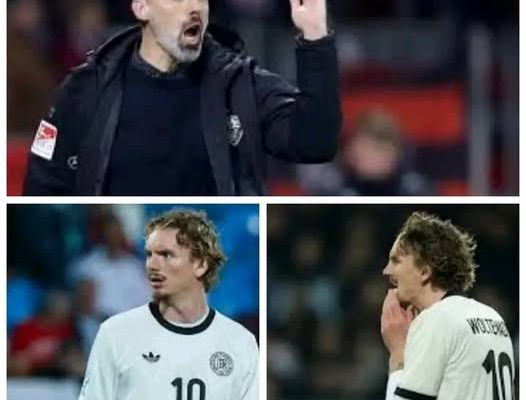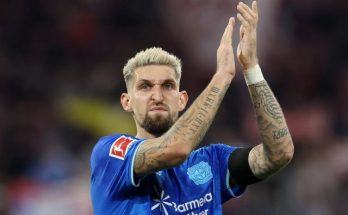The story surrounding Nick Woltemade and his future at VfB Stuttgart has quickly become one of the most intriguing narratives in German football. The talented forward, who arrived with plenty of expectations and has shown flashes of real quality, now finds himself at the heart of tense negotiations that could shape both his career trajectory and Stuttgart’s ambitions in the Bundesliga. Contract extensions in football are rarely straightforward, and when a player of Woltemade’s potential is involved, the dynamics become even more complex. The combination of salary expectations, competing transfer interests, and the club’s broader sporting project has created a situation that is as fascinating as it is precarious for both sides.
Woltemade’s role in Stuttgart’s recent campaigns has been a matter of growing significance. At just 22 years old, he has already demonstrated his ability to play as a versatile attacker, operating both as a central striker and in deeper, more creative roles when required. Stuttgart, who under Sebastian Hoeneß have tried to combine attacking flair with tactical discipline, see him as a crucial component of their medium- to long-term plans. His technical ability, height, and footballing intelligence make him a difficult player to replace, which is precisely why the club is pushing hard to secure an extension. For Stuttgart, keeping Woltemade is not just about maintaining squad depth—it is about ensuring continuity as they attempt to solidify their place among the Bundesliga’s top clubs.
However, the negotiations have proven far from easy. Salary demands are a major sticking point, with Woltemade’s camp reportedly seeking compensation that reflects both his current contribution and his potential future value. From the player’s perspective, the logic is simple: he wants to be rewarded on a level that matches his increasing influence and market worth. Stuttgart, meanwhile, find themselves constrained by financial realities. The club has grown steadily in recent years, but they do not have the spending power of Bayern Munich, Borussia Dortmund, or even RB Leipzig. They have to operate within a carefully balanced wage structure, and offering Woltemade a significant bump could potentially create a ripple effect across the squad, with other players demanding similar treatment.
Complicating matters further is the external interest in Woltemade. Several Bundesliga rivals, along with clubs abroad, have reportedly been monitoring his situation closely. For teams looking to invest in a young attacker with room to grow, Woltemade is an attractive option. He offers Bundesliga experience, physical presence, and adaptability, all qualities that are hard to come by in the transfer market. A free transfer or even a cut-price move if negotiations collapse would be an enormous opportunity for competing clubs. This interest strengthens Woltemade’s negotiating position considerably. He knows that if Stuttgart cannot meet his expectations, there will be no shortage of suitors willing to step in.
From Stuttgart’s point of view, losing him now would be a blow to their momentum. Under Hoeneß, they have developed into one of the league’s most exciting sides, blending youth development with clever acquisitions. Retaining players like Woltemade signals stability and ambition, whereas letting him go—especially without securing a proper replacement—could be interpreted as a step backwards. The club’s supporters are acutely aware of this, and there is a growing sense among fans that Stuttgart must show they are capable of competing not just on the pitch, but also in contract rooms. In a Bundesliga increasingly dominated by clubs with bigger budgets, making a strong stand with homegrown or carefully recruited talent is often the only way to stay relevant.
The tension also raises questions about the role of the player in Stuttgart’s future tactical setup. Hoeneß has shown flexibility in deploying attackers, sometimes leaning on more mobile forwards or creative wingers, but Woltemade offers something different—a target presence who can also link play. He is still developing and far from the finished product, but Stuttgart believe they can shape him into a leading striker if he commits long-term. For Woltemade, the question becomes whether he trusts the club to provide the platform for him to reach his peak. Ambitious players often weigh not only financial compensation but also the sporting project: Can this team compete for European places? Will it help me showcase my abilities for the national team? Will I have the chance to test myself against Europe’s elite?
In Woltemade’s case, these questions are pressing. Germany’s next generation of forwards is still searching for a clear leader, and international recognition is within reach for those who can consistently deliver at club level. Staying at Stuttgart, where he is valued and could grow into a central role, could provide the perfect environment for this leap. On the other hand, moving to a club with more established European credentials could accelerate that process—though at the risk of reduced playing time in a deeper squad.
The financial side cannot be ignored. Football at this level is a short career, and securing a lucrative deal early can provide long-term security. Stuttgart, for all their ambitions, will never be able to compete with the absolute top clubs in terms of wages. For Woltemade’s camp, this is a chance to push Stuttgart to their limit. For the club, it is a test of how far they are willing to stretch to keep a player they view as central to their plans. Both sides are fully aware of the stakes, which is why negotiations have dragged and why no quick resolution seems imminent.
The broader Bundesliga context adds another layer to the drama. Clubs like Eintracht Frankfurt, Bayer Leverkusen, and even Hoffenheim have all shown in the past how acquiring young domestic talent can pay off massively. If Stuttgart were to lose Woltemade to one of their direct competitors, the symbolic impact could be even more damaging than the sporting loss. It would signal vulnerability in their project, potentially discouraging future targets or emboldening rivals to approach their other emerging talents. Conversely, securing Woltemade on improved terms would be a strong statement of intent, proving that Stuttgart can hold onto their key players despite external interest.
Behind the scenes, the club’s management faces delicate calculations. Offering Woltemade a significantly improved contract would send a clear message of faith, but it would also put pressure on their wage structure. For a club like Stuttgart, this balance is everything. Financial mismanagement in the past has hurt them, and they cannot afford to gamble recklessly now. Yet, at the same time, standing too firm could backfire if it leads to losing a player who could generate far greater value in the future—both on the pitch and potentially through a transfer fee if he were to move later under contract.
The player himself appears calm but aware of the power he holds in this situation. Publicly, he has remained respectful towards Stuttgart, emphasizing his appreciation for the club and its supporters. However, silence can often be just as powerful as words, and his reluctance to rush into a new deal speaks volumes. His representatives are likely advising him to keep his options open, especially with transfer windows providing constant opportunities for movement. If no breakthrough occurs soon, the pressure will only intensify, particularly as fans and media begin to speculate more loudly about his future.
There is also a psychological component at play. Players in Woltemade’s position often find themselves torn between loyalty and ambition. Stuttgart gave him the chance to develop, and he has begun to repay that faith. Yet football careers are short, and the temptation of bigger stages and better contracts is always present. Negotiations, therefore, are not just about numbers but about vision. Stuttgart’s sporting directors must convince Woltemade that the club’s ambitions align with his own, that they are building something where he will be at the center. This narrative, if presented convincingly, can sometimes bridge gaps that money alone cannot.
For supporters, the saga is a familiar but frustrating part of modern football. They want their club to be competitive in the market while also staying true to its identity. Many see Woltemade as a symbol of what Stuttgart should represent: young, talented players growing into stars at the club. Losing him would feel like a betrayal of that identity. But fans also understand the financial realities and the difficulty of competing with Europe’s richest clubs. Their emotions add another layer of pressure, with every development scrutinized and debated across forums, social media, and fan groups.
As things stand, the situation remains unresolved. Both sides continue to talk, both sides continue to posture, and both sides know the clock is ticking. Each week that passes without agreement increases the risk of external interference. Transfer speculation will only grow louder as rival clubs sense an opportunity. Stuttgart must act decisively, but carefully, threading the needle between ambition and caution. Woltemade must decide whether the stability and trust he has at Stuttgart outweigh the potential benefits of testing himself elsewhere.
Whatever the outcome, this negotiation will serve as a telling indicator of Stuttgart’s trajectory in the coming years. If they manage to extend Woltemade’s contract, it will reinforce the narrative of a club on the rise, capable of holding onto its brightest talents. If they fail, it will expose the fragility of their project and remind everyone of the financial gap that still defines German football. For Woltemade, it is a defining moment in his young career, one that could shape not only his immediate future but also his long-term legacy in the game.
The coming weeks will be decisive. Will Stuttgart dig deep and make the financial and sporting promises necessary to secure their man? Or will Woltemade decide that his future lies elsewhere, in pursuit of bigger wages or bigger stages? As the talks drag on, one thing is certain: this is not just a contract negotiation, but a test of ambition, loyalty, and vision. For Stuttgart and Nick Woltemade alike, the stakes could hardly be higher.



